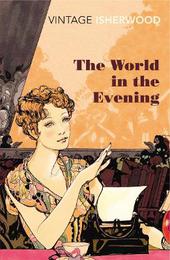
|
The World in the Evening
Paperback / softback
Main Details
| Title |
The World in the Evening
|
| Authors and Contributors |
By (author) Christopher Isherwood
|
| Physical Properties |
| Format:Paperback / softback | | Pages:352 | | Dimensions(mm): Height 198,Width 129 |
|
| Category/Genre | Modern and contemporary fiction (post c 1945)
Classic fiction (pre c 1945) |
|---|
| ISBN/Barcode |
9780099561149
|
| Classifications | Dewey:823.912 |
|---|
| Audience | |
|---|
|
Publishing Details |
| Publisher |
Vintage Publishing
|
| Imprint |
Vintage Classics
|
| Publication Date |
1 November 2012 |
| Publication Country |
United Kingdom
|
Description
The best prose writer in English' Gore Vidal At a party in the Hollywood Hills, Stephen Monk finds his wife in the arms of another man. Betrayed and furious, he packs his belongings and returns to the home he was born in. There he begins to retrace the steps that have brought him to this crisis. He is reminded of his own betrayals and weaknesses. But most of all, the memory of his lost love, Elizabeth Rydal, haunts him. Can he forgive his wife, and most importantly, himself?
Author Biography
Christopher Isherwood was born in 1904. He began to write at university and later moved to Berlin, where he gave English lessons to support himself. He witnessed first hand the rise to power of Hitler and the Nazi party in Germany and some of his best works, such as Mr. Norris Changes Trains and Goodbye to Berlin, draw on these experiences. He created the character of Sally Bowles, later made famous as the heroine of the musical Cabaret. Isherwood travelled with W.H Auden to China in the late 1930s before going with him to America in 1939. He died on 4 January 1986. His novel A Single Man was recently made into an award-winning film by Tom Ford, starring Colin Firth and Julianne Moore.
ReviewsA brilliant enigma. -- New York Times W H AUDEN, Louis MacNeice, Stephen Spender, Christopher Isherwood, C Day Lewis. The brat-pack of their day. They are still considered by many to have been the great writers of the 1930s... Isherwood alone produced his greatest work during the thirties - Mr Norris Changes Trains (1935), Lions and Shadows (1938), Goodbye to Berlin (1939) - and yet more than any of the others he deserves to be regarded as a quintessentially modern writer, a writer with whom we can identify, a writer whose life was his work, and vice-versa. -- Guardian
|